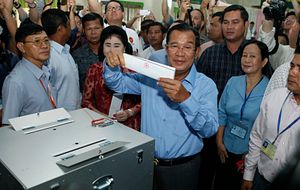Today marks the first anniversary of Cambodia’s latest general elections, but unfortunately there is little I want to celebrate.
A year ago, on July 29, 2018, my fellow citizens participated in elections that were more about rubber stamping a rising autocracy than freely choosing their leader. Prior to the vote, Prime Minister Hun Sen did all he could to ensure his re-election.
My political party, the Cambodia National Rescue Party (CNRP) — the only viable opposition force in the country – – was disbanded by an arbitrary Supreme Court ruling. Most of the party’s leadership — myself included — was forced into exile while our president, Kem Sokha, was detained on trumped up charges. At the same time, independent media outlets were forced to shut down and human rights activists were jailed.
Ahead of the vote we called on people to boycott the sham election. We called it the “clean finger” campaign because on election day the authorities dip fingers in ink to prevent double voting. The government was so worried that the boycott would draw further attention to what a farce the election had become that they immediately threatened to arrest anyone who intented to take part.
On election day, more than half a million voters spoiled their ballots as a sign of protest. While 19 parties competed, not a single opposition party won a seat in the Parliament. Hun Sen’s party claimed all of the 125 seats that were up for grab.
One might have thought that after securing his re-election and having turned the country into an effective one-party state, Prime Minister Hun Sen would have eased his crackdown on critics. On the contrary, over the year since the vote, the authorities have become even more sensitive to even the mildest criticism.
Despite living in forced exile, I was charged in March along with seven other senior former members of the opposition for allegedly “plotting” and “inciting to commit a felony” because of meetings we attended overseas. The charges are a clear and unsubtle warning that if we were to come back, we will end up in jail.
In June, at least 140 other former members of my party and activists received a judicial summons. Some were harrassed, others physically attacked, detained, or threatened. This treatment is not just reserved for our sympathizers; any critical voices are targeted. Gripped by paranoia, the authorities went as far as seeing noodle soup meals as illegal political gatherings.
What the past year has taught us is that as Hun Sen’s paranoia grows, our democratic freedoms shrink. There are reasons for Hun Sen to worry. Cambodia’s growing youth population is hungry for liberty, modernity, and justice. Connected to the rest of the world through social media, they have no direct memories of Cambodia’s tormented past.
After 34 years in power, Hun Sen knows that the time for a handover of power is inevitably approaching — a nervous time for any non-democratic regime. By cracking down on all forms of opposition, many suspect that he is trying to assert control over every aspect of Cambodia’s politics, judiciary, and economy to ensure a secure and smooth succession to one of his sons. Rather than treating the running of the country like a family business, he should focus on Cambodia’s development and worry about the dire situation of many of his fellow citizens.
The irony is that without a viable opposition to provide checks and balances and push for social and economic reforms, he is increasingly likely to fail at the most basic tasks of governance.
His desire to cement his grip on power is not just denying Cambodians basic freedoms, but also sound governance and economic development.
With no opposition to give legitimacy, Hun Sen is further isolating himself not only from the Cambodian people, but from the international community as well.
In February the EU — citing the democratic collapse and serious human rights violations — launched the procedure to suspend Cambodia’s duty-free trade privileges under the “Everything but Arms” program. This unprecedented step by the EU, normally reserved for war-torn states that have seen atrocity crimes, is an indication of how serious the situation has become.
Just recently, the U.S. House of Representatives unanimously passed the bipartisan Cambodia Democracy Act. If adopted in the Senate it would freeze assets and restrict visas for senior officials who undermined democracy and violated human rights. This law puts Cambodian senior officials alongside Myanmar military leaders, who were also sanctioned for the ethnic cleansing of the Rohingya minority.
Of course such measures would disappear if Hun Sen and his party could overcome their crippling fear of competitive democratic politics.
Unfortunately they are hardly alone in cracking down on all forms of opposition in the region. Across Southeast Asia, be it in Thailand or the Philippines, ruling parties are undermining democracy and attacking political opponents. Other countries from the region, under the guise of noninterference, are failing to take collective action to address growing authoritarianism, pushing Southeast Asia further into the orbit of China.
One year ago, Cambodians went to the polls in a sham election that only served to turn our country into an effective dictatorship. Since then, personal freedoms have been restricted even further, and the lack of a viable opposition is threatening our country’s development.
Next year, I hope that we will have more positive news to look back on. Allowing me and my colleagues to return home without the fear of arrest would be a first, positive step in the right direction.
Mu Sochua, former Cambodian MP and vice president of the CNRP, is a board member of the ASEAN Parliamentarians for Human Rights (APHR).

































